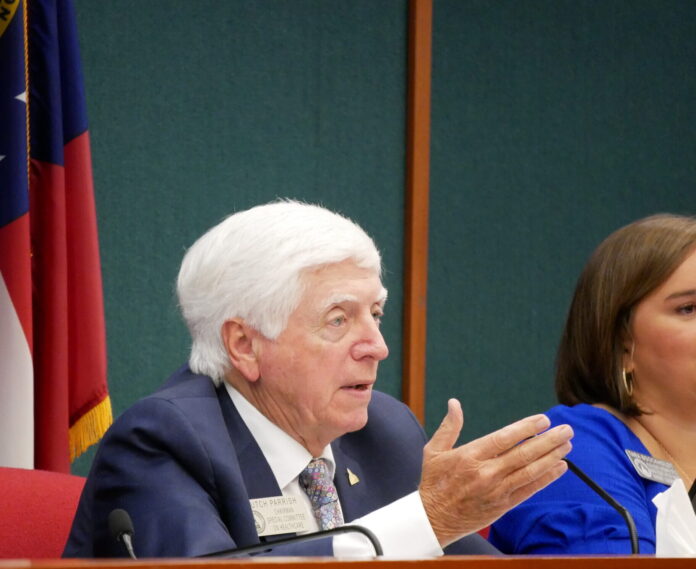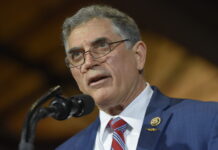
(Georgia Recorder) — A long-awaited health care proposal from House leaders would ease health care business regulations in some cases, but the measure is just as notable for what it does not do: expand Medicaid.
Instead, the bill calls for a new commission that would be tasked with advising the governor, lawmakers and the state agency that administers Georgia’s Medicaid program on issues related to the access and quality of health care available for the state’s high number of uninsured residents.
It also raises the cap on the state’s rural hospital tax credit program to $100 million a year, up from $75 million.
But mostly, the measure focuses on the state’s certificate-of-need rules. It would, for example, allow a new acute care facility to open in a rural county if they meet certain requirements, such as agreeing to serve as a teaching hospital and serve as a trauma center. Easing the program’s rules for rural hospitals was a sticking point last year.
New or expanded psychiatric or substance abuse inpatient programs would also be allowed to sidestep the restrictions, so long as they have an agreement with a nearby hospital. That proposed change is a nod to the state’s continued push to improve access to mental health treatment.
“It’s like working a Rubik’s Cube. When you figure one part of it, there’s another part of it that’s got to be worked,” said the bill’s main sponsor, Swainsboro Republican Rep. Butch Parrish. “But I really think this is a great step forward in trying to move health care in this state ahead and provide better health care all across the state to folks so we have better access to quality health care for everybody, no matter what your ZIP Code is.”
The proposal, though, was seen as a sign that this would not be the year that Georgia expands Medicaid coverage under the Affordable Care Act.
This year’s legislative session had started with chatter after GOP leaders showed interest in an Arkansas-style model of expansion, which uses federal funds to purchase private plans for its low-income residents. Any proposal was expected to be tied in some way to changes to the certificate-of-need rules, similar to a deal passed in North Carolina last year.
Georgia is part of a shrinking number of states that have not expanded Medicaid. Instead, the state has adopted a partial expansion for low-income adults who satisfy 80 hours of work, school, or other qualifying activity each month. Less than 3,000 people had signed up as of December.
Parrish said the nine-person commission will provide feedback to help determine what happens next, including whether Georgia should pursue a private option to expand coverage.
“We’re going to listen to whatever they’ve got to say,” Parrish told a reporter Wednesday.
The commission, dubbed the Comprehensive Health Coverage Commission, would be appointed by July and face a December deadline to file its first report.
“We want something that we can try to do right now,” Parrish said of the plan to create a commission. “And we feel like it’s important that we get the feedback from these folks to see how this is working and how we can tweak it to make it better as we go along.”
The proposal received its first hearing Wednesday, drawing several proponents of full Medicaid expansion who urged lawmakers to act with a sense of urgency.
“Nearly half a million of our fellow Georgians, many of whom are veterans – approximately 21,000 – and farmers or our hourly and part-time and gig workers and their families can’t wait for an option to close the coverage gap,” said Natalie Crawford, executive director of Georgia First.
“We need you to act with urgency. They need a plan to close the gap now,” she added.
Leah Chan, director of health justice at Georgia Budget and Policy Institute, argued that each year without full expansion puts further strain on the state’s cash-strapped rural hospitals.
“We really feel that the time is now for Georgia to make this fiscally responsible choice and pivot to a solution that works better for Georgians and for our state’s bottom line,” Chan told lawmakers.
Some supporters of full expansion said they remain hopeful that something can still happen this session.
Julie Vojtech, government relations director for the American Cancer Society Cancer Action Network (ACS CAN) in Georgia, urged lawmakers to stay focused on “immediate solutions.”
“More than 63,000 Georgians will be diagnosed with cancer this year. They can’t wait for treatment,” Vojtech said in a statement. “It’s important we keep options open and on the table during the 2024 legislative session.”
Rep. Michelle Au, for one, says she isn’t giving up.
“Some say it was foolish that we ever hoped it would happen, but until that gavel comes down on Sine Die, I will not believe that. Because I still believe that this body can accomplish something transformative together. And until it’s over, I think we owe it to people to try,” the Johns Creek Democrat said at a press conference held Wednesday.
Crossover Day, when a bill needs to clear at least one chamber to have a smooth path to becoming law, is next Thursday. The session ends March 28.
“There is still time for lawmakers to act on this issue – rather than agree to study it – before Sine Die,” said Laura Colbert, executive director of Georgians for a Healthy Future. “Instead of spending another year for a committee to tell us what we already know, lawmakers should seize the momentum that has been built and put forward legislation that allows Georgia to close the coverage gap this year.”
The bill also faces pressure from groups like Americans for Prosperity that would like to see lawmakers go much further in scaling back the state’s certificate-of-need regulations. The Georgia Hospital Association, meanwhile, is assessing the impact of the changes designed to ease the rules for some health care facilities.
“The commission is an added bonus, but we remain committed to streamlining CON,” said Anna Adams with the hospital association.
Georgia Recorder reporter Ross Williams contributed to this report.







